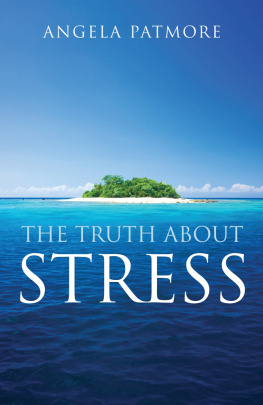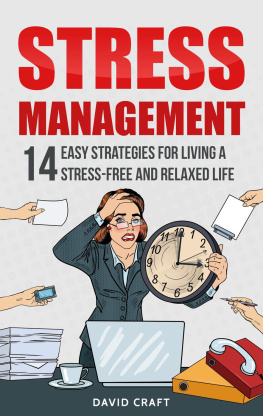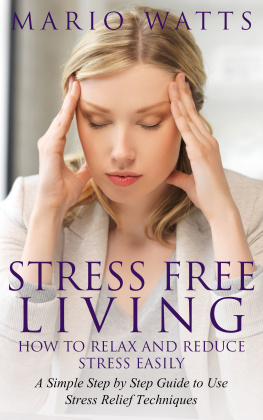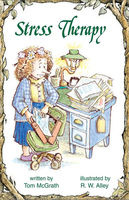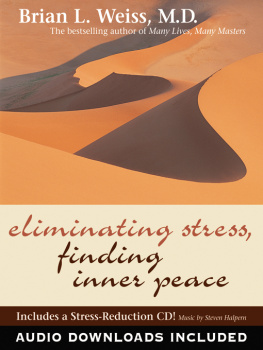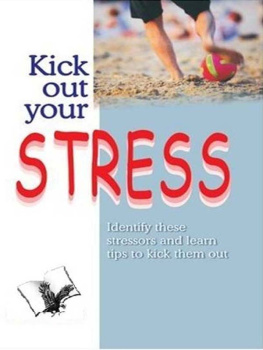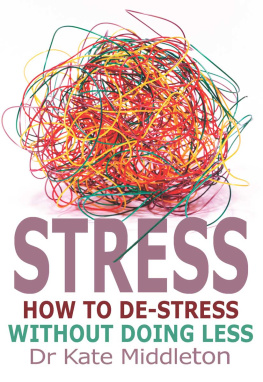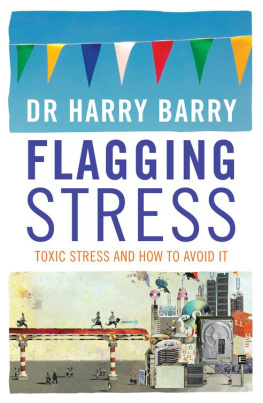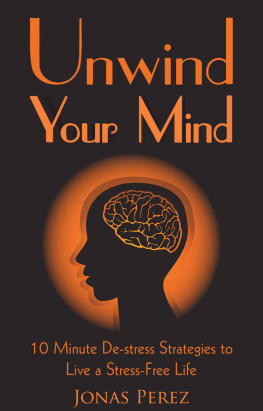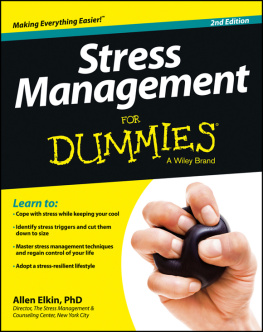The Truth About STRESS
Angela Patmore is a former University of East Anglia research fellow and International Fulbright Scholar. Her analysis of competitive pressure, Sportsmen Under Stress (1986), was a Times sports book of the year. A former Guardian columnist on the psychology of sport, she writes extensively for newspapers and magazines and has contributed to many television and radio programmes on stress. The Truth About Stress was shortlisted for the MIND Book of the Year Award 2007.

To Sidney McGee
First published in trade paperback in Great Britain in 2006 by Atlantic Books, an imprint of Grove/Atlantic Ltd.
This paperback edition published in 2009 by Atlantic Books.
Copyright Angela Patmore, 2006
The moral right of Angela Patmore to be identified as the author of this work has been asserted by her in accordance with the Copyright, Designs and Patents Acts of 1988.
All rights reserved. No part of this publication may be reproduced, stored in a retrieval system, or transmitted in any form or by any means, electronic, mechanical, photocopying, recording, or otherwise, without the prior permission of both the copyright owner and the above publisher of this book.
Every effort has been made to trace or contact all copyright holders. The publishers will be pleased to make good any omissions or rectify any mistakes brought to their attention at the earliest opportunity.
10 9 8 7 6 5 4 3 2 1
A CIP catalogue record for this book is available from the British Library.
ISBN: 978 1 84354 236 0
eISBN: 978 1 78239 500 3
Set in Monotype Sabon
Designed by Nicky Barneby @ Barneby Ltd
Printed in Great Britain
Atlantic Books
An imprint of Grove Atlantic Ltd
Ormond House
2627 Boswell Street
London
WC1N 3JZ
www.atlantic-books.co.uk
CONTENTS
ACKNOWLEDGEMENTS
The author would particularly like to thank the Royal Literary Fund and the Russell Trust for their generous financial contributions to this project. Many thanks to Fay Weldon, to Ruth Lea, director of the Centre for Policy Studies, to Lord Brian Mackenzie of Framwellgate, and to Dr John Cooper for all their support and encouragement. Thanks to Alison Cobb and MIND for information on prescription drug-addiction; to Richard Hughes and the Department of Health for help with prescription statistics; to Boris Cetnik of Berrymans Lace Mawer, London Occupational Disease Unit for permission to quote from Dr Martin Baggaleys diagnostic guide, and to Professor David Ball and UEAs Centre for Environmental Risk for access to research data. Thanks to Rosemary Anderson, Chair of ISMA, to Dr David Wainwright, to Peter Goodwin, IHP and to Andrew Nicholls, StressCheck for granting interviews. For access to their research literature I should like to thank Dr Rob Briner, Emeritus Professor Brian Thorne, Dr Jo Rick and Professor Andrew Guppy. And grateful thanks to Toby Mundy and Louisa Joyner of Atlantic Books for editorial wisdom.
Finally, thanks for their time, help and co-operation to: Dr Dale Archer, Dr Carole Astbury, Beat the Benzos, Barry Haslam and Mike Behan, the BMA, for information on GP counselling, the British Association for Counselling and Psychotherapy, the British Heart Foundation, Belinda Linden, the British Hypertension Society, Sandra Caldwell, HSE, Marcvs Cassivs, Legion XIIII, Eric Davidson, for his translation of La Provence en Archipel, Dr Martin Deahl, Dame Judi Dench, the Duke of Edinburgh Award Scheme, Dr Richard Earle, Dr Susan Hallam, Judy Leden, Dr Richard Lippin and the International Arts Medicine Association, Dr Pim van Lommel, Dr David Lorimer, the MHRA, for information on benzodiazepines, Dr Julian Miller, Dr David Murray-Bruce, Dr Michael ODonnell, Outward Bound, Dr Reg Peart, Victims of Tranquillisers, Dr Mark Popplestone, Les Roberts, NASUWT, Brian Robinson, UKNWSN, Carole Spiers, Dr Alan Watkins, Jim Wilkes and Professor James Woudhuysen.
Whilst every effort has been made to keep facts and statistics up to date, some may have changed during the long process of publication.
IS THIS PERSON QUALIFIED?
Authors Introduction
Since you have opened this book, I hope you will also open your mind. Even if at present you very firmly believe in the term stress and use it all the time, and even if you are thoroughly convinced that it is a real entity or illness, and that you or those around you are suffering from it, I would ask you to listen to the evidence presented in the following pages that you may have been deceived about your perfectly normal feelings and bodily mechanisms, and that this deception may be harming your health and happiness.
But first, let us clear up an important misunderstanding, one that is otherwise likely to prejudice you against the contents of this book. Although the author has been routinely dismissed by members of the stress industry as unsympathetic to stress sufferers, this is untrue and unfair. The whole purpose of my work on this subject has been to provide information that will help them help themselves. I believe the stress mythology harms everyone, but that it harms the most vulnerable most of all.
I write from professional and personal experience and twenty-five years research into emotional crises in the arts, in sport and in scientific literature. My book deals objectively with that research and sets it out as clearly and concisely as possible. In addition, I shall tell you about relevant events in my personal life, so you may judge to what extent my experiences have shaped my objections to the stress ideology and stress therapy.
A career in pressure
Ironically, when I am not writing or advising on stress, I work in what many people consider a highly stressful profession I teach. I am a motivational trainer for the long-term unemployed in Colchester. As part of a small company, Mojo Associates, my job is to provide practical strategies and skills to help candidates overcome loss of confidence, fears, phobias and barrier beliefs. I enhance their courage by giving them techniques to improve their assertiveness, their people skills, their emotional toughness and their respect for the wonders of the brain. We have an excellent track record on getting peoples lives restarted. As somebody who regularly stands up in front of a class of unemployed men and women of all ages, many of them surly and dejected, and all of them dragged kicking and screaming into my presence by the Employment Service, I would be the first to concur that teaching is a challenge. But unlike those thousands of teachers keen to retire from the profession on grounds of stress, I find the challenge supremely rewarding.
I have also worked as a Metropolitan Police external expert on workplace stress and served on the Commissioners panel of advisers on the subject. My role there was to suggest ways of stripping out medicalizing stress psychology from our thinking in order to revert to a more credible (non-engineering) terminology. I argued against subjecting officers to a stress audit, suggesting that this might make matters worse. While everyone understands the need for supporting individual officers distressed by the horrors of the job, I felt that pre-emptive medicalizing of the psychology of policemen and women, and monitoring their heads for stress, however well-intentioned, would encourage introspection and eventually undermine their ability (and their willingness) to do frontline work.
Long before this I had written a number of books with and about people involved in emotionally taxing and difficult jobs. With Marje Proops, who for many years was the

